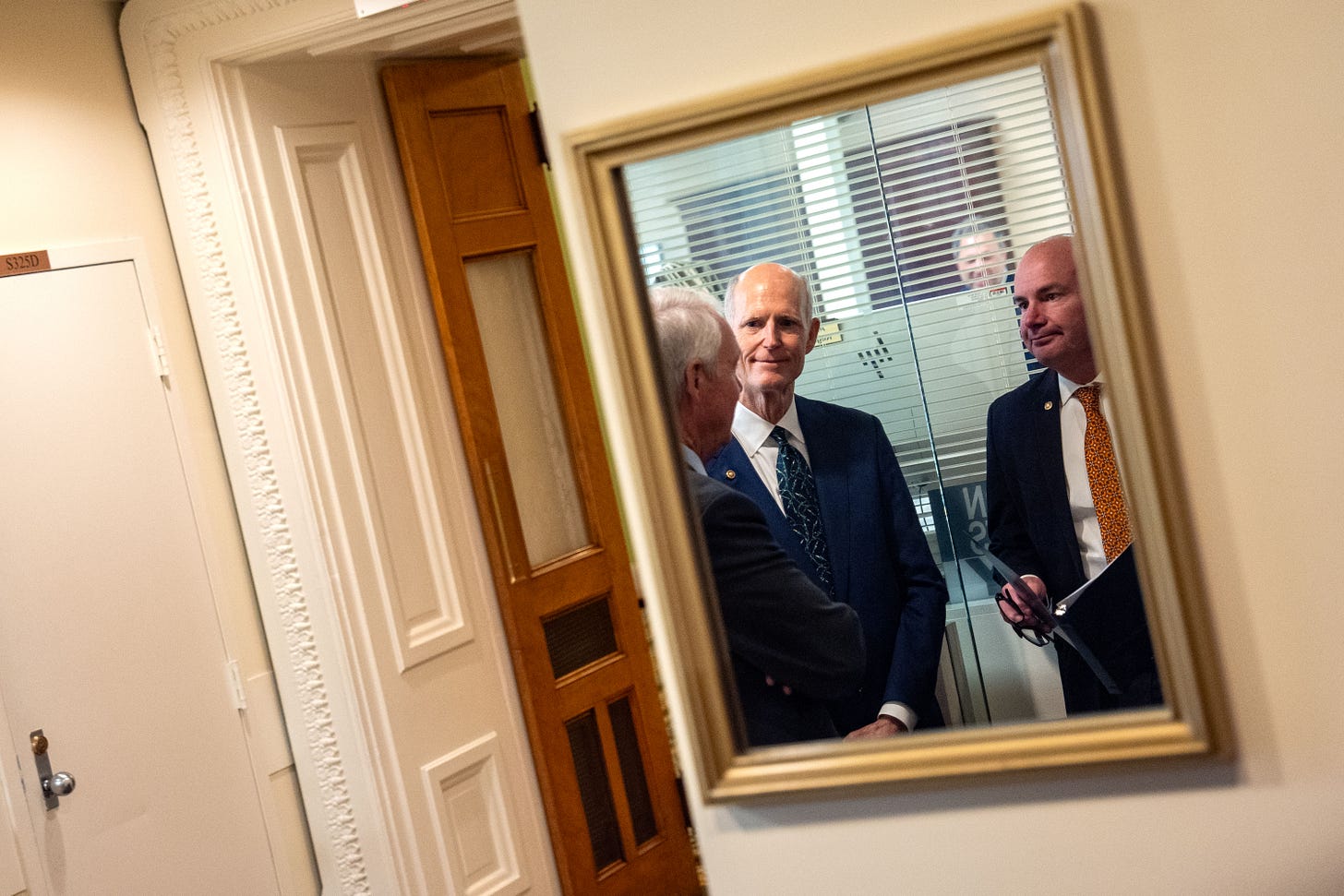A stock trading ban for Congress is a no-brainer. And yet.
You can have their brokerage accounts when you pry them from their cold dead hands.
🗣️ Paid subscribers keep Public Notice free. If you appreciate our fiercely independent coverage of American politics, please sign up and support us. 👇
When he signed the Stop Trading on Congressional Knowledge (STOCK) Act in 2012, Barack Obama insisted that “the powerful shouldn’t get to create one set of rules for themselves and another set of rules for everybody else.”
Members of Congress were buying and selling stocks in sometimes alarming amounts, and it was at least suspected that many were doing so based on the information they learned in their jobs. So the STOCK Act reiterated that using non-public information to inform stock trades is insider trading, and required that all trades from members of Congress must be disclosed within 45 days.
From that moment, our representatives in Washington thought only of the public’s welfare while in office, setting aside their personal financial interests as a new era of integrity in government dawned.
Or perhaps not.
What actually happened is this: Members of Congress realized that the disinfecting power of sunshine is not always all it’s cracked up to be, especially when few pay attention to STOCK Act disclosures, and the punishment for violating the law is a whopping $200 fine. While it’s possible that at some point or another a member of Congress has decided not to make a well-timed trade because they’d have to report it, they don’t seem to mind too much.
Which is why it’s significant that Congress is, for real this time, contemplating a ban on members buying and selling individual stocks. Under a bill sponsored by Sen. Josh Hawley that recently passed out of a Senate committee when Hawley joined the committee’s Democrats in voting for it (with all the other Republicans opposed), members would have to put their holdings into mutual funds or similar vehicles while they’re in office. Notably, the rules would even apply to the president and vice president, though conveniently the current president is exempted — the latest version of the bill would apply only to future presidents.
Whatever you think of Hawley’s motives (which are always worth questioning), if nothing else this should be an opportunity to get everyone running for office on record. Donald Trump’s second administration has brought an explosion of corruption unlike anything we’ve seen in modern times, and once he leaves office, there ought to be a sweeping revision of the laws that rival the post-Watergate reforms. Would it be too much to ask that members of Congress take a break from buying and selling individual stocks while they’re doing the public’s business?
Keeping their brokers on speed dial
From the way Republicans reacted to Hawley’s bill, you’d think it is indeed too much to ask, despite the fact that he tried to win their support by naming it the Preventing Elected Leaders from Owning Securities and Investments (PELOSI) Act.
Former Speaker of the House Nancy Pelosi — or actually, her husband Paul — has been a particularly active trader for many years, leading many on the right to insist that she must be guilty of insider trading. But the bill’s title didn’t assuage Republicans, and to win Democratic support, Hawley agreed to change the name; it’s now called the Halting Ownership and Non-Ethical Stock Transactions (HONEST) Act.
But no awkward moniker will fool Republicans into overlooking the bill’s sinister intent.
“I don’t know when in this country it became a negative to make money,” said an indignant Sen. Rick Scott, who bought and sold over $40 million of stocks last year. “How many of you don’t want to make money? Anybody want to be poor?”
One might respond that there are at least one or two ways to avoid being poor that don’t involve frantic stock trading, but others in the GOP picked up the baton.
Sen. Ron Johnson called the bill “obnoxious.” Sen. Rand Paul told Fox Business that if Trump ran for a third term (which he can’t), then under this bill “he would have to sell all his possessions” (which he wouldn’t). Paul went on to say that “some of the success of Donald Trump being president is that he was used to the world of high finance, used to making deals with large amounts of money, and I don’t think we want to discourage people like that from holding office.”
It certainly would be terrible if the nation were deprived of future leaders with the “high finance” background of the creator of Trump University (that unfortunate $750,000 fine for stock-related shenanigans notwithstanding). Predictably, Trump lashed out at Hawley, saying “I don’t think real Republicans want to see their President, who has had unprecedented success, TARGETED, because of the ‘whims’ of a second-tier Senator named Josh Hawley!”
But the truth is that nobody is poor because they have to keep their stock holdings in mutual funds; the trading of individual stocks is, generally speaking, a hobby for the very wealthy and the delusionally overconfident.
A note from Aaron: Enjoying this article from Paul? Then please sign up to support our work 🚀 Paid subscribers keep PN free for everyone 🚀
While over six in ten Americans own stock, the vast majority of those are invested in retirement accounts and mutual funds. According to a study by the Federal Reserve, in 2022, only 21 percent of American families directly owned stocks (the number was up from 15 percent four years before). But only some of those are actively trading stocks — many likely have some they are just holding on to.
Combine that with the default assumption so many Americans have that politicians are corrupt, and this issue seems like a political no-brainer. A few polls have asked about stock trading by members of Congress, and found overwhelming majorities in favor of banning it.
As of now, there’s nothing to stop a member who serves on the Armed Services Committee from buying and selling stock in military contractors, or those on the Banking Committee from doing the same with bank stocks. That’s not to mention the well-timed tip a member might get (that’s what sent former congressman Chris Collins to jail for insider trading; you’ll never guess who pardoned him).
Some candidates have made an issue of stock trades. In 2020, the prolific trading of then-Sen. David Perdue — who made over 2,500 trades in one term, including in companies overseen by the committees he served on — became a significant campaign liability, likely contributing to his defeat by Jon Ossoff.
It’s telling that members like Rick Scott react with such horror to the idea that they’d have to keep their stock holdings (in Scott’s case, hundreds of millions of dollars) in mutual funds like the rest of us. Why, that would make them contemptible losers, no better than any of the teeming masses. Imagine only getting a 10 percent yearly return on your investments, like some peasant!
That’s one way to think about it. Or we could insist that public service is a public trust, and it’s not much to ask that for the time someone serves in Congress — since they’re not supposed to be there to get rich — they put their stock holdings into stable and reliably profitable investment funds, then concentrate on doing the public’s business.
To be clear, this is not a strictly partisan issue. There are a few Republicans who support a ban on stock trading, and plenty of Democrats with little enthusiasm for it. Instead, it’s an issue where Democrats will come down on the right side when they’re forced to, even if they aren’t all that eager to press the issue (for example, Joe Biden endorsed a ban on congressional stock trading — after the 2024 election was over). And Republicans will wind up defending every ugly feature of the system as it exists, especially if it’s something that Trump takes advantage of to pad his own bank account.
It’s important for Democrats to remember that regardless of the fact that one can find Trump bros cheering on whatever latest crypto scam the president and his family have engineered, as a general rule, voters hate corruption. It doesn’t take much to convince them that their suspicions about self-dealing politicians are correct. That sentiment is both a political and a substantive resource that can be used to create an opening for genuine and sweeping reform. An insistence that members of Congress stop trading stocks will be pretty limited in the effect it has. But it’s a fair place to start.
That’s it for today
We’ll be back with more tomorrow. If you appreciate today’s newsletter, please do your part to keep Public Notice free by signing up for a paid subscription.
Thanks for reading, and for your support.







If Joni Ernst runs for re-election, Democrats will use this committee vote against her. The Iowa Democratic Party put out this statement last week:
BREAKING: Joni Ernst Votes Against Congressional Stock Trading Ban
Ernst continues to cash in on access while Iowa families struggle to keep up
DES MOINES – Yesterday, Senator Joni Ernst voted against a bipartisan bill to ban congressional stock trading, allowing her to continue profiting off her position in public office while Iowans work harder than ever to make ends meet.
Just weeks after voting for the toxic GOP plan that strips health insurance away from as many as 120,000 Iowans, Ernst is once again siding with the wealthy and well-connected, this time protecting her ability to personally benefit from insider information instead of doing what’s right for her constituents.
“Joni Ernst failed on her campaign promise to make D.C. squeal and has completely lost touch with Iowans. She’s already breaking her two-term pledge and now she’s voting to enrich herself and wealthy insiders at the expense of the rest of us,” said Iowa Democratic Party Spokesperson Paige Godden. “That’s why she voted to cut Medicaid for tens of thousands of Iowans, that’s why she cut funding for rural radio, and that’s why she refuses to ban individual stock trading.”
(note: I checked Ernst's personal financial disclosures and as far as I can tell she holds index funds and mutual funds, not individual stocks)
Ban stock trading for Congress